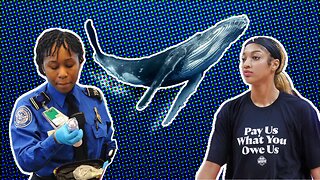Premium Only Content

War Clouds - WWI - Grantland Rice Story - Ep. 13
Henry Grantland Rice was an early 20th-century American sportswriter known for his elegant prose. His writing was published in newspapers around the country and broadcast on the radio.
This program shares Grantland's experiences in the Army in WWI.
In 1907 Rice saw what he would call the greatest thrill he ever witnessed in his years of watching sports during the Sewanee–Vanderbilt football game: the catch by Vanderbilt center Stein Stone, on a double-pass play then thrown near the end zone by Bob Blake to set up the touchdown run by Honus Craig that beat Sewanee at the very end for the SIAA championship.[6] Vanderbilt coach Dan McGugin in Spalding's Football Guide's summation of the season in the SIAA wrote, "The standing. First, Vanderbilt; second, Sewanee, a mighty good second;" and that Aubrey Lanier "came near winning the Vanderbilt game by his brilliant dashes after receiving punts." Rice coached the 1908 Vanderbilt baseball team.
Rice was an advocate for the game of golf. He became interested in golf in 1909 while covering the Southern Amateur at the Nashville Golf Club. It was not his first golf event, but it was the one that seemed to pull him toward the game.[8]
After taking early jobs with the Atlanta Journal and the Cleveland News, he later became a sportswriter for the Nashville Tennessean. The job at the Tennessean was given to him by former Sewanee Tigers coach Billy Suter, who coached baseball teams against which Rice played while at Vanderbilt. Afterwards he obtained a series of prestigious jobs with major newspapers in the northeastern United States. In 1914 he began his Sportlight column in the New York Tribune. He also provided monthly Grantland Rice Sportlights as part of Paramount newsreels from 1925–1954.[9] He is best known for being the successor to Walter Camp in the selection of College Football All-America Teams beginning in 1925, and for being the writer who dubbed the great backfield of the 1924 Notre Dame Fighting Irish football team the "Four Horsemen" of Notre Dame. A Biblical reference to the Four Horsemen of the Apocalypse, this famous account was published in the New York Herald Tribune on October 18, describing the Notre Dame vs. Army game played at the Polo Grounds:
-
 18:12:15
18:12:15
Chesterton Radio
1 year ago $4.09 earnedChesterton Radio Live - Christmas Mystery-Drama-Adventure-Comedy - Chuck the TV & Discover a Whole New World!
17.3K2 -
 46:10
46:10
Members Club
16 hours agoThe WNBA Has Demands, TSA Loosens Up, and NYC Has a Whale Whisperer - MC04
13 -
 1:35:15
1:35:15
Man in America
13 hours ago🚨 ALERT: Hospitals in the U.S. Are KILLING Patients… for Their Organs!
70.9K30 -
 8:00
8:00
DropItLikeItsScott
13 hours agoIs This The BEST SIG P365? SIG P365 FUSE
34 -
 11:55
11:55
The Shannon Joy Show
12 hours ago🔥Babies Aborted for Cash.🔥
476 -
 6:24
6:24
Zach Humphries
13 hours agoBreaking Crypto News on Crypto Regulation!
301 -
 15:41
15:41
BaldBrad
14 hours agoDeclassified BOMBSHELL: CIA Lied About Trump-Russia! Putin Never Backed Trump | Russiagate Exposed
893 -
 13:07
13:07
Nate The Lawyer
15 hours ago $0.02 earnedWNBA Loses $500M But Players Want More Money. $40M Lost Last Year.
2412 -
 11:43
11:43
Zoufry
17 hours agoThe McDonald's Ice Cream Machine Conspiracy
9181 -
 14:54
14:54
DeVory Darkins
1 day ago $4.23 earnedTrump just announced MAJOR TRADE deal as CNN confronts Khalil over gaza
8.41K47